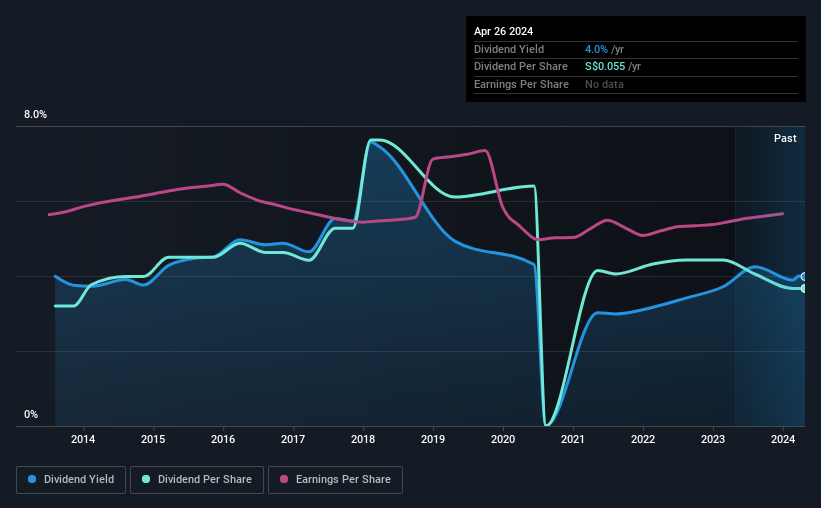Here's Why We're Wary Of Buying VICOM's (SGX:WJP) For Its Upcoming Dividend
Readers hoping to buy VICOM Ltd (SGX:WJP) for its dividend will need to make their move shortly, as the stock is about to trade ex-dividend. Typically, the ex-dividend date is one business day before the record date which is the date on which a company determines the shareholders eligible to receive a dividend. The ex-dividend date is important as the process of settlement involves two full business days. So if you miss that date, you would not show up on the company's books on the record date. Therefore, if you purchase VICOM's shares on or after the 2nd of May, you won't be eligible to receive the dividend, when it is paid on the 13th of May.
The company's upcoming dividend is S$0.0275 a share, following on from the last 12 months, when the company distributed a total of S$0.055 per share to shareholders. Last year's total dividend payments show that VICOM has a trailing yield of 4.0% on the current share price of S$1.38. Dividends are a major contributor to investment returns for long term holders, but only if the dividend continues to be paid. That's why we should always check whether the dividend payments appear sustainable, and if the company is growing.
Check out our latest analysis for VICOM
Dividends are usually paid out of company profits, so if a company pays out more than it earned then its dividend is usually at greater risk of being cut. VICOM paid out more than half (71%) of its earnings last year, which is a regular payout ratio for most companies. That said, even highly profitable companies sometimes might not generate enough cash to pay the dividend, which is why we should always check if the dividend is covered by cash flow. VICOM paid out more free cash flow than it generated - 114%, to be precise - last year, which we think is concerningly high. We're curious about why the company paid out more cash than it generated last year, since this can be one of the early signs that a dividend may be unsustainable.
VICOM does have a large net cash position on the balance sheet, which could fund large dividends for a time, if the company so chose. Still, smart investors know that it is better to assess dividends relative to the cash and profit generated by the business. Paying dividends out of cash on the balance sheet is not long-term sustainable.
VICOM paid out less in dividends than it reported in profits, but unfortunately it didn't generate enough cash to cover the dividend. Were this to happen repeatedly, this would be a risk to VICOM's ability to maintain its dividend.
Click here to see how much of its profit VICOM paid out over the last 12 months.
Have Earnings And Dividends Been Growing?
When earnings decline, dividend companies become much harder to analyse and own safely. If business enters a downturn and the dividend is cut, the company could see its value fall precipitously. So we're not too excited that VICOM's earnings are down 4.5% a year over the past five years.
Many investors will assess a company's dividend performance by evaluating how much the dividend payments have changed over time. Since the start of our data, 10 years ago, VICOM has lifted its dividend by approximately 1.4% a year on average.
The Bottom Line
Is VICOM worth buying for its dividend? VICOM had an average payout ratio, but its free cash flow was lower and earnings per share have been declining. It's not that we think VICOM is a bad company, but these characteristics don't generally lead to outstanding dividend performance.
So if you're still interested in VICOM despite it's poor dividend qualities, you should be well informed on some of the risks facing this stock. Be aware that VICOM is showing 2 warning signs in our investment analysis, and 1 of those makes us a bit uncomfortable...
Generally, we wouldn't recommend just buying the first dividend stock you see. Here's a curated list of interesting stocks that are strong dividend payers.
Have feedback on this article? Concerned about the content? Get in touch with us directly. Alternatively, email editorial-team (at) simplywallst.com.
This article by Simply Wall St is general in nature. We provide commentary based on historical data and analyst forecasts only using an unbiased methodology and our articles are not intended to be financial advice. It does not constitute a recommendation to buy or sell any stock, and does not take account of your objectives, or your financial situation. We aim to bring you long-term focused analysis driven by fundamental data. Note that our analysis may not factor in the latest price-sensitive company announcements or qualitative material. Simply Wall St has no position in any stocks mentioned.

 Yahoo Finance
Yahoo Finance 
